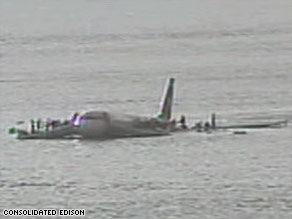
The National Transportation Safety Board on Tuesday will launch three days of hearings into the circumstances surrounding the US Airways Flight 1549 emergency landing on New York’s Hudson River.
Looking into several issues from the January 15 incident — from migratory birds to why a rear door opened after the landing — the NTSB panel will hear testimony from key witnesses, including Capt. Chesley “Sully” Sullenberger, the pilot; and Billy Campbell, the only passenger scheduled to testify. On Monday, the NTSB corrected remarks made by board member Robert Sumwalt, who was quoted by The Associated Press as saying Campbell was being called to contradict statements made by flight attendant Doreen Welsh, who has said a panicked passenger opened the rear door. The NTSB said Sumwalt, who will lead the three days of hearings, was mistaken and that Campbell’s written statement does not suggest Welsh opened the rear door. NTSB spokesman Peter Knudson said the board asked Campbell to testify because he had the most detailed statement of those people in the cabin at the time of the crash. “Safety Board investigators interviewed 145 passengers, each of whom provided their own perspective on what happened,” the NTSB said Monday night. “Some of the passenger reports conflicted with the accounts of other passengers, including accounts of how the rear door was opened.” “What was consistently reported by those inside the plane was that the water entered the aft section of the cabin immediately while everyone was still seated,” the statement said, adding that the NTSB will focus on how the water gushing “affected the ability of the passengers and the crew to evacuate the aircraft since two of the four slide-rafts were in the rear of the plane, on each of the rear doors, and they could not be used.”
Don’t Miss
Migratory birds downed plane
Passengers get items they thought were lost forever
Sullenberger was the pilot in command during the flight, which lost power in both engines after hitting a flock of Canada geese. Bird detection, and standards for engines to handle bird strikes, are among subjects to be covered in the hearing. Other topics include pilot training for ditching and forced landings on water, and cabin-safety training, emergency procedures and equipment.